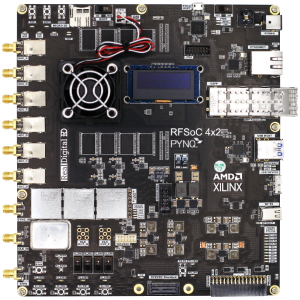New free eBook: SDR with Zynq Ultrascale+ RFSoC
This book introduces Zynq Ultrascale+ RFSoC, a technology that brings real, single-chip, Software Defined Radio (SDR) to the marketplace. The book is accompanied by Jupyter Notebooks that can be run on your RFSoC-PYNQ enabled board, illustrating key concepts including sampling and quantisation, filter design, Fourier’s theorem and FFTs, pulse shaping, QAM, frequency planning, Forward-Error-Correction, and OFDM.
See the book website www.rfsocbook.com to download your free copy of the eBook and details on how to purchase hard copies.
RFSoC-PYNQ

RFSOC-PYNQ is an extension to PYNQ bringing support for the AMD Zynq RFSoC family of devices. RFSoC created a new class of integrated circuit architecture for the communications and instrumentation markets. RFSoC combines high-accuracy ADCs and DACs operating at Giga samples per second (GSPS), with programmable heterogeneous compute engines.
RFSoC-PYNQ provides Python APIs, libraries and drivers for the RFSoC, example overlays and designs, tutorials and other resources for RFSoC users.
RFSoC-PYNQ features
- PYNQ framework with Jupyter Lab for exceptional ease-of-use
- Python APIs for RFSoC clock and data converters
- Support for RFSoC Gen 1, Gen 2 and Gen 3 devices including the AMD University Program RFSoC 4x2
- Complete end-to-end reference designs including spectrum analyzers and software defined radios (see Overlays)
- Open-source educational resources including teaching materials, notebooks, and design examples
- GitHub-hosted repositories of all project materials
The RFSoC 4x2 is the recommended kit to get started using RFSoC-PYNQ.
RFSoC 4x2
RFSoC 4x2 key features
- New Gen 3 Zynq UltraScale+ RFSoC ZU48DR
- Faster 5GSPS ADCs and 9.85GSPS DACs
- Higher resolution 14-bit ADCs
- Maximum RF input frequency increased to 6 GHz
- Two additional ADCs (four in total)
- New high-speed QSFP28 interface supporting 4x25Gbps, 2x50Gbps or 1x100Gbps Ethernet
- New OLED display for improved boot-time status
- New battery-backed real-time clock
- Upgraded open-source Overlays including Spectrum Analyzer design supporting higher RFSoC Gen 3 ADC/DAC frequencies and wider bandwidth
For more details and purchasing information see the RFSoC 4x2 Overview.
RFSoC 2x2 discontinued
Due to global supply challenges the RFSoC 2x2 kits are discontinued.
Support
See the PYNQ community Support forum for discussion and to post support questions related to RFSoC-PYNQ.
For other enquiries contact the AMD University Program.

